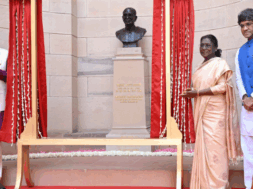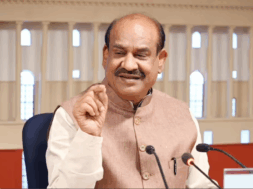
SC Halts “Bulldozer Justice,” Executives not Authorised to Declare an Accused Guilty
Manas Dasgupta
NEW DELHI, Nov 13: The Supreme Court on Wednesday came down heavily on the “bulldozer justice” and virtually banned all kinds of demolitions without serving proper notice and giving at least 15 days’ time to shift to another house and warned all officials found guilty of demolishing any house without strictly following the court-laid guidelines of not only facing contempt of court but also to be punished by recovering the cost of demolition from his or her salary.
The bench of Justice BR Gavai and Justice KV Viswanathan delivered its judgment on petitions challenging bulldozer action against people accused of crimes. This trend, which caught on in several states, is referred to as ‘bulldozer justice’. State authorities have, in the past, said only illegal structures were demolished in such cases. But several petitions were filed before the court, flagging the extrajudicial nature of the action.
The bench also cautioned that the state cannot usurp the powers of court and act as the judge and decide an accused to be guilty to decide whether an accused was guilty before he was tried in a court of law and demolish the house of any accused. “The State cannot usurp judicial functions to become a judge to hold a person guilty before he is tried in a court of law,” the bench said.
The court observed that the construction of a house for an average citizen was an embodiment of years of aspiration, dreams of security. Bulldozing private homes of accused illegally was an arbitrary action and a naked display of the dictum “might is right.” Such high-handedness by the State has no place in democracy, and should be dealt with a heavy hand.
Justice Gavai said it was the dream of every family to have a house and an important question before the court was whether the Executive should be allowed to take away someone’s shelter. “It is a dream of every person, every family to have a shelter above their heads. A house is an embodiment of the collective hopes of a family or individuals’ stability and security. An important question as to whether the executive should be permitted to take away the shelter of a family or families as a measure for infliction of penalty on a person who is accused in a crime under our constitutional scheme or not arises for consideration,” the judgment said.
The court said, “The Executive and its functionaries, obliged to protect citizens, cannot consider themselves judges who decide an accused guilty and demolish his home and property in an arbitrary, high-handed and discriminatory manner.”
The court further added that the protection of the judgment would not extend to encroachments into public land or unauthorised structures, but banned demolition even of such property without serving due notice and giving an opportunity to the guilty of acting on the notice.
The judgment described the “chilling sight” of the bulldozer rumbling in to destroy citizens’ fundamental right to shelter under Article 21 of the Constitution. “It strikes a blow at the rule of law if the State and its agencies demolish a house of an accused only on the basis of an accusation. The Executive cannot become a judge and demolish the properties of the accused persons. The chilling sight of a bulldozer demolishing a building when authorities have failed to follow the basic principles of natural justice and have acted without due process reminds one of a state of affairs wherein might was right,” Justice Gavai observed in the judgment.
“For considering the said question, we will be required to consider the principle of the rule of law, which is the very foundation of democratic governance. We will also have to consider the rights guaranteed under the Constitution that provide protection to individuals from arbitrary state action. We will also have to consider in this case the issue with regard to fairness in the criminal justice system, which mandates that the legal process should not prejudge the guilt of the accused. We will also have to touch upon the concept of separation of powers and the doctrine of public trust in respect of government officials holding their offices,” it added.
On the separation of powers, the bench said adjudicatory functions are entrusted to the judiciary and the “Executive cannot replace the Judiciary.” “If the executive in an arbitrary manner demolishes the houses of citizens only on the ground that they are accused of a crime, then it acts contrary to the principles of ‘rule of law’. If the executive acts as a judge and inflicts penalty of demolition on a citizen on the ground that he is an accused, it violates the principle of ‘separation of powers.'”
The court said accountability must be fixed on public officials who take law into their hands and act in a high-handed manner. “State and its officials can’t take arbitrary and excessive measures. If any officer of the State has abused his power or acted in total arbitrary or malafide manner, he cannot be spared,” it added.
Justice Gavai pointed that when a particular structure is chosen for demolition suddenly and similar other properties are not touched, then the presumption could be that the real motive was not razing the illegal structure, but “penalising without trial.” “For an average citizen, construction of a house is the culmination of years of hard work, dreams and aspirations. House embodies collective hope of security and future. If this is taken away, authorities must satisfy it is the only way,” the bench said.
The court also questioned if authorities can demolish a house and deprive its residents of shelter if only one person residing there is an accused. “Punishing such persons who have no connection with the crime by demolishing the house where they live in or properties owned by them is nothing but an anarchy and would amount to a violation of the right to life guaranteed under the Constitution.”
The bench underlined that an individual, whether an accused or an undertrial or a convict, have rights as any other citizen. “They have a right to dignity and cannot be subjected to any cruel or inhuman treatment. The punishment awarded to such persons has to be in accordance with law. Such punishment cannot be inhuman or cruel.”
An accused, the court said, cannot be declared guilty “unless proven so beyond reasonable doubt before a court of law.” “They cannot be declared guilty, unless there is a fair trial,” the bench said.
“The chilling sight of a bulldozer demolishing a building, when authorities have failed to follow the basic principles of natural justice and have acted without adhering to the principle of due process, reminds one of a lawless state of affairs, where ‘might was right’,” the court said, adding that such “high-handed and arbitrary actions” have no place in our Constitution.
Using its powers under Article 142 of the Constitution, the Supreme Court laid down guidelines for demolitions. It said no demolition should be carried out without a showcause notice. The person this notice is served to can respond within 15 days or the time provided in local civic laws, whichever is later, for the residents to find another place to live in. “Children, women and senior citizens should not be rendered homeless.” Justice B.R. Gavai said and added that “Demolitions must be videographed and be produced as evidence in case of challenge to its legality.”
The guidelines laid down by the apex court include prior notice of demolition should be served on the house owner by registered post. The notice must provide details of the nature of the unauthorised construction, details of specific violations and grounds warranting the action of demolition.
The designated authority must give an opportunity of personal hearing to the owner. The minutes of such a meeting must be recorded. The final order of authority must give the contentions of the owner and reasons for overruling. A report on the actual demolition must be placed before the Municipal Commissioner.
Violation of the court’s directions would lead to contempt proceedings, the bench warned. Officers should be told that if a demolition exercise is found to be in violation of norms, they will be held responsible for restitution of the demolished property, the court said. The cost for this, the court said, would be recovered from the officials’ salary, the court ordered.
The court said all local municipal authorities must set up a digital portal within three months that has details of showcause notices served and final orders on illegal structures. The bench clarified that its directions won’t be applicable for unauthorised structures in public places such as road, street, footpath, railway lines or water bodies and in cases where there is an order for demolition by a court of law.
A batch of petitions was filed before the Supreme Court in 2022, in connection with the demolition drive scheduled for April of the same year, in Delhi’s Jahangirpuri. While the drive was stayed, the petitioners prayed for a declaration that authorities could not resort to bulldozer action as a form of punishment.
One of these petitions was by former Rajya Sabha MP and CPI(M) leader Brinda Karat. During a hearing in September 2023, senior advocate Dushyant Dave (appearing for some of the petitioners) voiced concerns about the rising trend of state governments demolishing the homes of people accused in crimes, stressing that the right to a home was a facet of the right to life under Article 21 of the Constitution.














